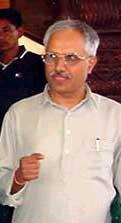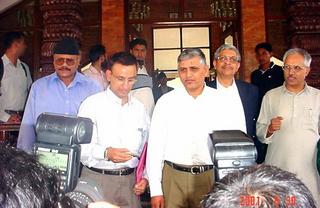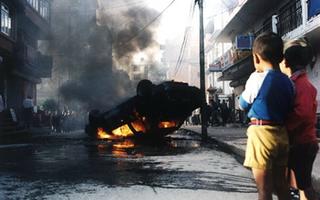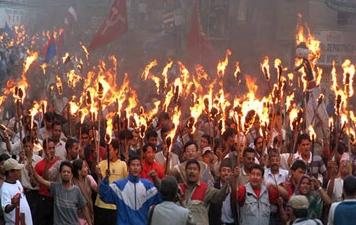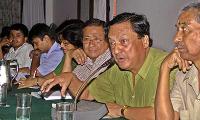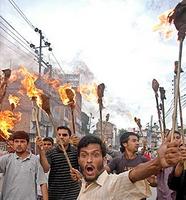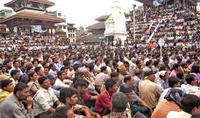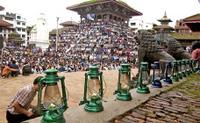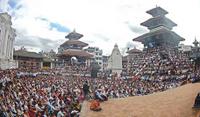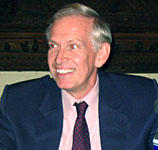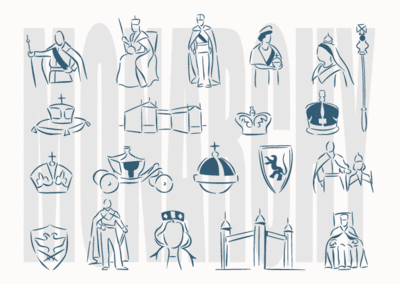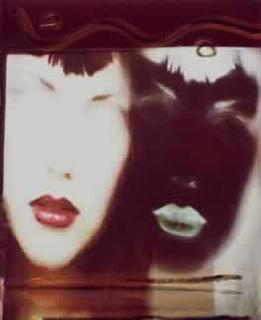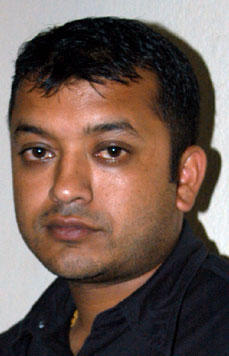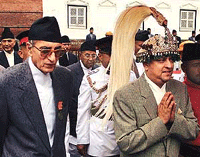 "This is not how it was supposed to be. It's not something that the NSU needed right now"
"This is not how it was supposed to be. It's not something that the NSU needed right now"—Gagan Thapa
Towards the beginning of Gagan Thapa’s speech, the last amongst those to have spoken, two men started announcing various notices on a microphone from the roof of the Sabha Griha. Mahadev Gurung and Raju Adhikari were then spotted on the rooftop as well. The latter is the secretary of the Nepal Deshbhakta Sangh, Kaski Jilla, the pro-monarch nationalistic organization started by now Assistant Minister Nuchee Shamsher Rana. Eyewitnesses at the venue reported that the police chose to merely observe, doing absolutely nothing even when face-to face with the injured—instead, a police jeep was seen leaving the venue during the violence.
(Source: Samudaya)
There is no one reason why it happened, there are several. But what happened is unfortunate. It is a setback to the democratic movement.
A NSU with a clear program and a clear leader brought forth through elections based on an accurate voting list would have given a major boost to the movement. The momentum thus generated would have had a major positive impact on the NC convention.
But instead there was a physical fight.
It all apparently started with a Mandale throwing a reportedly 20 kilogram rock on Gagan Thapa from a roof and barely missing him. This is key. The perpetrator is on a government minister's payroll.
These are the primary culprits:
(1) Girija Koirala. His people clearly tried to hijack the NSU convention. They tried to bypass the election process by preaching "consensus" at first. When that did not go anywhere, they messed around with the voters' lists. A gang within the Nepali Congress that ousted a duly elected Gagan Thapa from the NSU a few years back is the same gang that tried to prevent Gagan Thapa from duly getting elected NSU President. This highlights the need for internal democracy within parties and organizations. Girija Koirala has every right to stick to his constitutional monarchy mantra, but he has no right to use foul means to try and silence those with republican sentiments. Girija is plain jealous of Gagan's wide popularity. He thinks the king is jailing and releasing Gagan to sideline Girija, and suggested as much. That is so petty on his part.
(2) State-sponsored Mandales. What if the 20 kilogram rock had not missed Gagan Thapa? Does this not count as an attempt on his life? And if the perpetrator is a man of a cabinet minister, what is one to think? That people at the highest levels were involved? The incident brought forth chaos and confusion. And that brought the Gagan and Girija factions within the NSU into physical clashes with each other. Because once the chaos ensued, noone in the crowd had the time to figure out it was actually a Mandale who started the whole thing.
(3) Once the fight started, the police actually left the venue. That was the exact opposite of what they should have done. Maybe there is autocracy in the country, but Nepal is still a state, and the law enforcement officers are still on the Nepali people's payroll. The police should have stayed and intervened to calm things down. Yes, you heard me right.
(4) The NSU itself. Measure up, folks. For the sake of democracy.
So what's next?
I think the NSU should hold its convention at the earliest. The Mandale involvement in this fracas should fuel the movement further. Introspection here will help.
This is not defeat. This is only a temporary setback.
Girija Koirala needs to be confronted at the NC convention for the sake of internal democracy in a major party. It is the democratic process that should decide the party's agenda, and the party leadership.
Nepali Congress' lack of internal democracy is one of the biggest reasons the people have not come out in larger numbers to support the movement.
And as for physical attacks by Mandales, the democratic government will have the option to investigate and punish. They are not the stronger crowd, by no means.
Any personal attack on Gagan Thapa is an attack on the movement itself. If you disagree with him, debate him!
Criminal acts are to be dealt with as such.
Nepal's Polity Score 1946-2003

